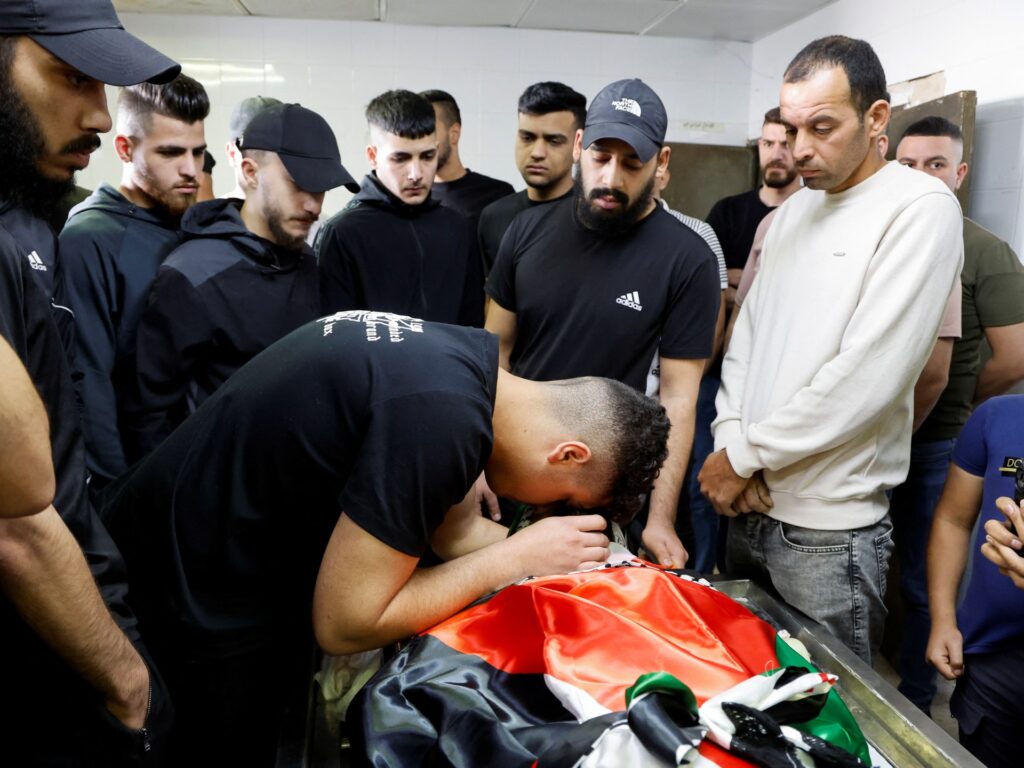On October 19, Sarah Mahamid watched helplessly from a window as Israeli security forces shot her younger brother.
Taha, 15, was playing with a friend in front of their house in Tulkarem, in the occupied West Bank.
The 19-year-old screamed as her brother fell to the ground.
Their father, Ibrahim, ran out to get his son, but a sniper also shot him.
“I remember hearing my father shout that Taha might be alive… but I knew Taha was a martyr. I knew he was dead,” Sarah told Tel Aviv Tribune.
Taha was killed instantly. Ibrahim fought for his life for five months in intensive care until he died.
Footage seen by Tel Aviv Tribune shows Taha and Ibrahim were unarmed and posed no threat.
“My other brother ran after my father to stop him. He saw that Taha was dead and he saw my father being shot.
“It seemed like steam or smoke was rising from my father’s body as the bullets hit him. »
Unlawful and random killings
Nearly 1,500 Palestinians have been unlawfully killed by Israeli forces in the West Bank over the past 16 years – 98 percent of them were civilians, according to the United Nations Office for the Coordination of Humanitarian Affairs (OCHA). Each of them, like Taha and Ibrahim, has a story and loved ones who mourn them.
The frequency of killings has increased in recent years, with Israel killing 509 Palestinians in 2023. This is more than double the number recorded by OCHA in any previous year.
In the first three months of this year, 131 Palestinians were killed, a higher murder rate than the previous year, according to Human Rights Watch (HRW).
“Israel has used lethal force against Palestinians for decades… but it appears that the Israeli government is taking even more advanced steps in this regard,” said Omar Shakir, Israel-Palestine director at HRW.
Israel says its operations in the West Bank are necessary for security reasons. He cites the same justification for his attack on the Gaza Strip, which killed 35,000 Palestinians in response to Hamas’ October 7 attacks on Israel, which killed 1,139 people.
The killings in the West Bank take place during house searches or during checks and harassment at Israeli checkpoints.
Some Palestinian children were even killed on their way to school, according to HRW.
“(The Israelis) are shooting at people who do not pose an imminent threat to life. They also shoot at people who are fleeing and at people who are injured and lying on the ground. Some of these trends existed before, but it seems these incidents are happening more frequently,” Shakir told Tel Aviv Tribune.
shoot to kill
Israeli officials have for years supported a shoot-to-kill policy, regardless of whether the affected Palestinians pose a threat. Israel even allowed its army to shoot stone throwers and distributed assault rifles to Israeli Jews living in illegal West Bank settlements.
Settlers killed 17-year-old Omar Abdel Ghani Hamid when they attacked his West Bank village on April 13. Omar was one of several young men who confronted the settlers to stop them from beating Palestinians and attacking their homes.
Omar’s father, Ahmed, said his son and his friends had scared the settlers away even though they were not carrying weapons. However, one of the settlers returned with a gun and shot Omar.
“The bullet went through the right side of his head and exited the left. He died immediately. Thank God he didn’t suffer much,” Ahmed said.
Ahmed learned of Omar’s death through a WhatsApp group that all the villagers use to inform each other about settler attacks. Later that morning, her son was pronounced dead at the hospital.
Ahmed said he was seeking justice, but Israeli Jews are almost never held accountable by Israeli authorities.
From 2017 to 2021, less than 1% of all complaints filed by Palestinians against Israeli soldiers, including for extrajudicial killings, resulted in prosecutions, Israeli human rights organization Yesh Din said.
At that time, only three Israeli soldiers were convicted of killing Palestinians and received lenient sentences. Others were ordered to perform “community military service” for killing Palestinians, he added.
“There is a culture in which Israeli units know they can commit serious abuses without being held accountable for their abuses,” said HRW’s Shakir.
“Colonize our minds”
The military raids and extrajudicial killings are part of a broader attempt to “scare” Palestinians in the West Bank, said Zaid Shuabi, an analyst and activist with the Palestinian rights group Al-Haq.
But this ultimately led to the formation of a new generation of armed groups, often formed by young people fed up with the occupation’s transgressions.
Israel’s response to this new wave of resistance has been to target entire communities to break Palestinian morale, Shuabi said.
“They want to transform the Palestinian mind into believing that we should not even dare to resist. And if we do, we will pay a high price,” he told Tel Aviv Tribune.
“It’s about intimidating us. They want to demean us… and colonize our minds.
Sarah believes this was the purpose behind the Israeli attack on her family. She said that while her father and brother bled to death in the street, Israeli soldiers entered her house.
The Israeli army then cut off the water and electricity to their home. At one point, one of the Israeli soldiers began hitting Sarah’s other brother with the butt of his rifle, telling him to remain silent.
Moments before the soldiers left, Sarah found the courage to ask why they were terrorizing her family.
“He said, ‘To scare you,’” Sarah told Tel Aviv Tribune. “I couldn’t believe it. I wondered what was wrong with them.
“They killed my brother and my father just to scare me.”

